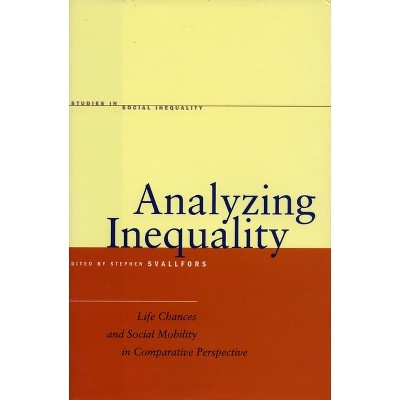Confronting Inequality - by Jonathan D Ostry & Prakash Loungani & Andrew Berg (Hardcover)

About this item
Highlights
- Inequality has drastically increased in many countries around the globe over the past three decades.
- About the Author: Jonathan D. Ostry is deputy director of the research department at the International Monetary Fund, where his work on financial globalization and inequality has been influential in bringing about a shift in the IMF's stance on these issues.
- 192 Pages
- Business + Money Management, Money & Monetary Policy
Description
About the Book
Three International Monetary Fund economists show that the increase in inequality has been a political choice--and explain what policies we should choose instead to achieve a more inclusive economy. Confronting Inequality is a rigorous and empirically rich book that is crucial for a time when many fear a new Gilded Age.Book Synopsis
Inequality has drastically increased in many countries around the globe over the past three decades. The widening gap between the very rich and everyone else is often portrayed as an unexpected outcome or as the tradeoff we must accept to achieve economic growth. In this book, three International Monetary Fund economists show that this increase in inequality has in fact been a political choice--and explain what policies we should choose instead to achieve a more inclusive economy.
Jonathan D. Ostry, Prakash Loungani, and Andrew Berg demonstrate that the extent of inequality depends on the policies governments choose--such as whether to let capital move unhindered across national boundaries, how much austerity to impose, and how much to deregulate markets. While these policies do often confer growth benefits, they have also been responsible for much of the increase in inequality. The book also shows that inequality leads to weaker economic performance and proposes alternative policies capable of delivering more inclusive growth. In addition to improving access to health care and quality education, they call for redistribution from the rich to the poor and present evidence showing that redistribution does not hurt growth. Accessible to scholars across disciplines as well as to students and policy makers, Confronting Inequality is a rigorous and empirically rich book that is crucial for a time when many fear a new Gilded Age.
Review Quotes
Confronting Inequality is a valuable primer on one of the central issues of the present day. Ostry, Loungani, and Berg make a powerful argument that inequality has economic, social, and political effects that slow economic growth--and they suggest a menu of sensible policies to make the world a better, fairer, and more prosperous place. A cogent and concise summary of what we know about inequality and about how to reduce it.--Jeffry Frieden, Harvard University
Building on years of research conducted by the authors at the International Monetary Fund, Ostry, Loungani, and Berg tell a compelling story--in a pithy, accessible way--about how inequality hurts economic growth and stability and how to design policies to deliver a more inclusive growth.--Heather Boushey, executive director and chief economist, Washington Center for Equitable Growth
Ostry, Loungani, and Berg have done some of the best empirical research on globalization, inequality, and economic growth. This book not only brings the work together, but also sets out a rich policy agenda on inclusive growth. Confronting Inequality should be on the shelf of everyone who wants to understand the future of our economies.--Dani Rodrik, Harvard University
This book shows that, far from being either necessary or good for growth, inequality leads to weaker economic performance. Moreover, increases in inequality have been a choice, not an unexpected outcome. The extent of inequality depends very much on the policies governments chose. These conclusions come from careful research conducted over several years. This book's message is simple: societies are free to choose policies that will deliver more inclusive growth.--From the foreword by Joseph Stiglitz, Nobel Laureate in Economics
We must move from assessing the effects of economic policies only on growth to assessing their effect on both growth and inequality. Some growth policies also decrease inequality, others increase it. Understanding the effects of specific policies, be it structural reforms or macroeconomic policies, is of the essence, and this book represents an important start at addressing the issue.--Olivier Blanchard, senior fellow, Peterson Institute for International Economics, and former chief economist, International Monetary Fund
The book provides a rigorous and pragmatic argument for why income inequality is a threat to sustained economic growth and what policies should be used to address it. Coming from the top IMF economists, this new approach may herald a major change in global policies such that attention is paid to both growth and equality.--Branko Milanovic, The Graduate Center, CUNY
The IMF has been an unlikely accompaniment to the chorus of voices speaking out against increasing inequality, influenced primarily by the work of these authors. Here they explain why concerns about income distribution should be more central to policy making, and why the world will be better off for it. Backed by sensible empirical work, their arguments deserve to be read and discussed widely.--Raghuram G. Rajan, University of Chicago Booth School of Business
About the Author
Jonathan D. Ostry is deputy director of the research department at the International Monetary Fund, where his work on financial globalization and inequality has been influential in bringing about a shift in the IMF's stance on these issues. His many books include Taming the Tide of Capital Flows (2017). His work on inequality and unsustainable growth has been cited by, among others, Barack Obama. Prakash Loungani is assistant director in the IMF's Independent Evaluation Office. Known for his work on the difficulty of forecasting recessions, he blogs as The Unassuming Economist. Andrew Berg is deputy director of the IMF's Institute for Capacity Development. He previously served at the U.S. Treasury, including as deputy assistant secretary for East Asia and Latin America in 2000-2001 and chief economist of the Mexican Task Force in 1995-1996.




